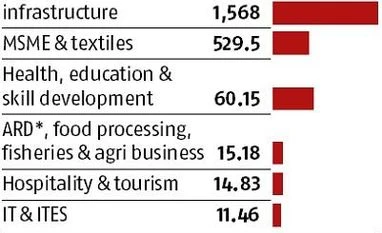That was just the beginning.
Bengal hosted a galaxy of stars from India Inc and beyond this year. The stars that shone the brightest among them were: Ambani, ArcelorMittal chairman and chief executive officer, Lakshmi N Mittal, JSW group chairman Sajjan Jindal, Adani Enterprises director Pranav Adani.
More than fancy numbers, what came across was that the icons of India Inc are weighing-in on a number of projects. Reliance plans to set up next generation state-of-the-art electronics manufacturing facilities and make West Bengal the hub for innovation and hi-tech technologies for consumer devices such as mobile phones, set-top boxes and other devices.
That apart, the group will be investing Rs 50 billion (Rs 5,000 crore) in Jio and the entire Jio digital eco-system, retail and petro-retail in the next few years. Plus, the Jio network, which currently covers 98 per cent of Bengal's population, will reach 100 per cent of Bengal's population before the end of 2018.
Reliance has emerged as one of the major investors in Bengal in the last two years with an investment of Rs 150 billion (Rs 15,000 crore), most of which is in the Jio network. And Ambani has committed to making Bengal one of the leading states in the country.
Jindal is considering investing Rs 100 billion (Rs 10,000 crore) over the next few years across cement, paints and steel segments. Ahead of the summit inauguration the Jindal family flew down for the inauguration of the cement plant at Salboni in West Medinipur by Chief Minister Mamata Banerjee. Though the 2.4-million-tonne cement plant is a shadow of the original project of a 10 million steel plant and 1,600Mw power plant planned earlier, there could well be some surprises, said sources. After all, it's not every day that 10 to 12 members from the Jindal family fly down for an inauguration.
Adani, when he took to the dais on the concluding day of the summit, said that he would like to replicate the Mundra port in West Bengal. The group is also interested in the power sector and food processing.
Mittal did not make any investment commitment, but cancelled a trip to Rome to be in Kolkata, for the summit. He had promised Chief Minister Banerjee he would be there.
Clearly, there is a change in the air. And the change is in the perception. Banerjee has made a successful shift from her rabble-rouser image to an industrialist-friendly chief minister. The fact that Bengal has also moved up the ranks in ease of doing business has come handy. It is currently at the top of table.
In terms of numbers, the summit resulted in investment proposals to the tune of Rs 2.2 trillion (Rs 2.2 lakh crore). A total of 110 Memorandums of Understanding (MoUs) were signed. In 2017, the investment proposals totalled Rs 2.35 trillion (Rs 2.35 lakh crore) and Banerjee said that close to 50 per cent had seeped in as investment.
But the focus of the summit was jobs and the proposals are projected to create two million jobs across manufacturing, IT, cement, services, tourism, infrastructure, skill development, health and education sectors.
Industry and Finance Minister Amit Mitra says around 1,00,000 jobs would be created by the leather industry. Uber has signed an MoU with the state transport department to create 1,00,000 employment opportunities. Chief Minister Mamata Banerjee said at the summit that Reliance's plans would translate into 1,00,000 jobs.
Mitra is also working on completing the petrochemicals chain in Bengal that has the potential to create 5,00,000 employment opportunities. Though Haldia Petrochemicals and Mitsubishi Chemicals have been operating in Bengal for over a decade, the state has not been able to reap the full benefit of them by way of downstream units.
So Mitra is trying to motivate Purnendu Chatterjee, the majority partner in Haldia Petrochemicals, and Aloke Lohia of Indorama, a partner in Dhunseri Petrochem, to set up more downstream units that will potentially create many opportunities including the job-intensive textile industry.
"This whole chain in Bengal is missing. Our target of the government strategically is to complete this chain. This will generate at least 5,00,000 jobs," he says.
"It's inter-connected," explains Mitra. "When you have five lakh (500,000) jobs in downstream, a proportion of that will relate to accounting and IT, those are white-collar jobs. In a changing world, there are no clerks anymore," he goes on to amplify.
Speaking of IT, Mitra says, TCS which has 38,000 employees in Kolkata, has created capacity for another 20,000 at its new campus in Rajarhat. The first phase of recruitment for the new campus is over, he points out.
Despite the seeming rush in IT, a real estate developer points out that there is still a lot of vacant built-up space in the IT hub of Salt Lake and Rajarhat.
Mitra rationalises, "Supply will create its own demand. Korea built three times its power necessity at one time and the whole world criticised them. But in six years, demand outstripped supply."
Mitra is already busy creating a pull for next year's summit. Thank you notes have gone out and the first brainstorming session has been held.
To read the full story, Subscribe Now at just Rs 249 a month
Already a subscriber? Log in
Subscribe To BS Premium
₹249
Renews automatically
₹1699₹1999
Opt for auto renewal and save Rs. 300 Renews automatically
₹1999
What you get on BS Premium?
-
Unlock 30+ premium stories daily hand-picked by our editors, across devices on browser and app.
-
Pick your 5 favourite companies, get a daily email with all news updates on them.
Full access to our intuitive epaper - clip, save, share articles from any device; newspaper archives from 2006.
Preferential invites to Business Standard events.
Curated newsletters on markets, personal finance, policy & politics, start-ups, technology, and more.
Need More Information - write to us at assist@bsmail.in
)